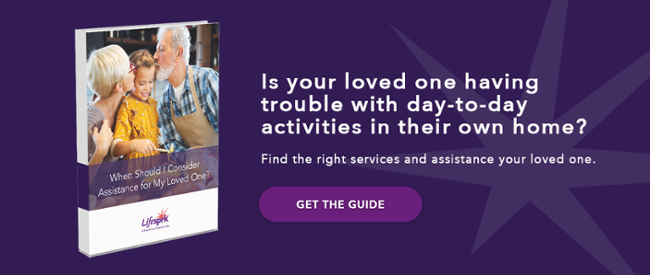
Women have been caring for people all their lives – spouses, children, aging parents, friends, but often, caring for themselves isn’t part of that equation. Anne Tumlinson said it well in her Daughterhood blog, “there’s an epidemic of ‘can’t say no’ among women.” That’s surely an understatement. We are so stressed and crazed trying to find the right balance between work and enjoying the lives we lead that we become lost in the activity of everyday life. If you think about it, in a way, we are to blame, why do we always say yes to everything – the extra work project, sports teams, added dance class, driving mom to the doctor’s and organizing . . . well everything? When did it become taboo to ask for help and enjoy the extra support?
Learn more about our FREE, 2-hour and how to schedule one today!
A recurring theme we’ve heard from our blog readers is that they believing caretaking of aging parents should reside with family. By family, it’s often the adult daughter. While we agree, it’s also okay to ask someone else to help out with mom or dad when you can’t so you can breathe and live your life too. There’s no shame in that. In fact, when we take the time to step back and do just that, we find we become better caregivers and more present in the act of caregiving and actually enjoy it more. The tasks seem less of a burden when we give ourselves permission to enjoy the moment. The value of what women caregivers provide each year is actually pretty profound – the Family Caregiver Alliance estimates the financial value of caregiving that women provide ranges from $148 billion to $188 billion of informal care each year.
At Lifesprk, we focus on the whole person. When we focus on our clients that often means you, too. We get it, we are moms and dads too, caring for children and aging parents, and we’ve learned from thousands of family members what works to create balance that helps everyone live with more purpose and passion, what we call, ‘a sparked life.’ To be able to give your loved one all you can without feeling overwhelmed is no small task, but there are ways to help you manage your life.
Here are a few tips from Anne’s blog and a few of our own based on what we’ve learned.
- Just because someone asks you to do something doesn’t mean you should do it. As Anne points out, this may seem obvious on the surface but you’d be surprised how many of us behave as if we must respond to every demand with an outpouring of our time and energy. The next time someone asks you to do something that you can’t or don’t want to, think about what you can or do want to do and offer that instead. Do what’s right for you.
- Have those tough conversations now before a crises hits. Stress and uncertainty is always heightened in a health care crisis and decisions are made quickly rather than thoughtfully with a long-term perspective . Mom just fell and broke her hip and the rehab doesn’t think she’ll be able to live on her own, now what? Or what happens when Dad’s memory declines quickly, what were his wishes? Our Life Care Managers (nurses) have seen over and over again that when people have those tough courageous conversations
 earlier before a crisis, they are able to be proactive about goals and wishes for when/if the time comes.
earlier before a crisis, they are able to be proactive about goals and wishes for when/if the time comes. - Put the oxygen on you first. It’s the airplane philosophy. If something happens aboard the plane and the oxygen mask drops, the first thing you do is put the oxygen mask on yourself first, even before your children. Why? Because if you aren’t physically able to care for others, who else will? You need to make sure you are doing everything you can to keep yourself optimal if you are going to care for others. Go ahead, we give you permission.
- Unless you are a professional, don’t pretend to be one. Think about that. You are the daughter, not the nurse or home health aide. Were you trained to know how to lift your 250 lb. dad from the shower? Are you comfortable helping mom by cleaning a wound? How do you make sure they are living a sparked life when they are experiencing memory issues? How do you know if they are safe and eating well at home if you aren’t there 24/7? And what other questions about medication or their care should you be asking at their next doctor’s appointment that could make or break their current independence level? Most home care providers want the same thing you do, to enhance, maintain and prolong control and independence for your parents. But it’s also our job from years of training and education to know how to look for long-term care and create whole person solutions that work for everyone.
Remember, asking for help doesn’t mean you’ve failed as a daughter. Quite the contrary, it’s that ‘aha moment’ you’ve been seeking when you know you get to be the daughter and do whatever part of the care you want, and leave the other stuff to the professionals. You’d be surprised at how much letting that go fills your heart and mind with joy rather than stress. Sparked living isn’t just for clients.
Have questions or need guidance? Call us 24/7, we can help.
Make sure you don’t miss a thing! Sign-up for our Seek On blog and stay connected with tips, resources and great articles all to spark your loved one to keep them healthier and independent longer.



